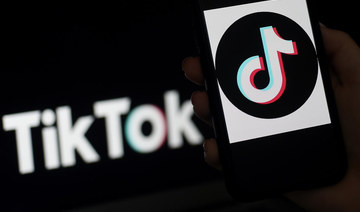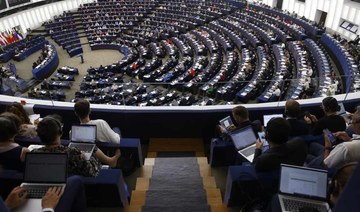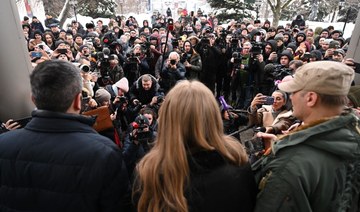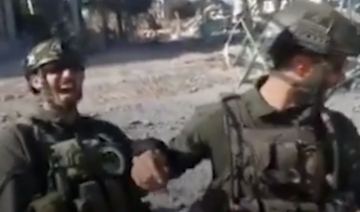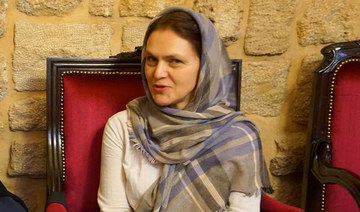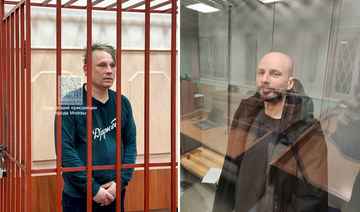NEW YORK: President Donald Trump said he will take action as soon as Saturday to ban TikTok, a popular Chinese-owned video app that has been a source of national security and censorship concerns.
Trump’s comments came after published reports that the administration is planning to order China’s ByteDance to sell TikTok. There were also reports Friday that software giant Microsoft is in talks to buy the app.
“As far as TikTok is concerned, we’re banning them from the United States,” Trump told reporters Friday on Air Force One as he returned from Florida.
Trump said he could use emergency economic powers or an executive order to enforce the action, insisting, “I have that authority.”
Reports by Bloomberg News and the Wall Street Journal citing anonymous sources said the administration could soon announce a decision ordering ByteDance to divest its ownership in TikTok.
There have been reports of US tech giants and financial firms being interested in buying or investing in TikTok as the Trump administration sets its sights on the app. The New York Times and Fox Business, citing an unidentified source, reported Friday that Microsoft is in talks to buy TikTok. Microsoft declined to comment.
TikTok issued a statement Friday saying that, “While we do not comment on rumors or speculation, we are confident in the long-term success of TikTok.”
ByteDance launched TikTok in 2017, then bought Musical.ly, a video service popular with teens in the US and Europe, and combined the two. A twin service, Douyin, is available for Chinese users.
TikTok’s fun, goofy videos and ease of use has made it immensely popular, and US tech giants like Facebook and Snapchat see it as a competitive threat. It has said it has tens of millions of US users and hundreds of millions globally.
But its Chinese ownership has raised concerns about the censorship of videos, including those critical of the Chinese government, and the potential for sharing user data with Chinese officials.
TikTok maintains it doesn’t censor videos based on topics sensitive to China and it would not give the Chinese government access to US user data even if asked. The company has hired a US CEO, a former top Disney executive, in an attempt to distance itself from its Chinese ownership.
US national-security officials have been reviewing the Musical.ly acquisition in recent months, while US armed forces have banned their employees from installing TikTok on government-issued phones. Secretary of State Mike Pompeo said earlier this month that the US was considering banning TikTok.
These national-security worries parallel a broader US security crackdown on Chinese companies, including telecom providers Huawei and ZTE. The Trump administration has ordered that the US stop funding equipment from those providers in US networks. It has also tried to steer allies away from Huawei because of worries about the Chinese government’s access to data, which the companies have denied it has.
The Trump administration has stepped in before to block or dissolve deals on national-security concerns, including stopping Singapore’s Broadcom from its $117 billion bid for US chipmaker Qualcomm in 2018 in an effort to help retain US leadership in the telecom space. It also told China’s Beijing Kunlun Tech Co. to sell off its 2016 purchase of gay dating app Grindr.
Other countries are also taking action against TikTok. India this month banned dozens of Chinese apps, including TikTok, citing privacy concerns, amid tensions between the countries.
Trump says he’ll act to ban TikTok in US
https://arab.news/4sz4j
Trump says he’ll act to ban TikTok in US
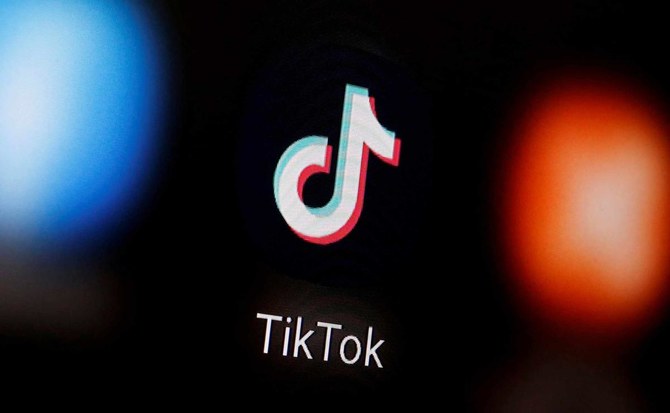
- The Chinese-owned video app that has been a source of national security and censorship concerns.
- China's ByteDance told to sell Tiktok and Microsoft is reportedly in talks to buy the app
Food delivery app HungerStation and Snapchat launch AR treasure hunt in Saudi Arabia

- Companies say the sponsored treasure hunt is a world first
- Great AR Hungerhunt is part of HungerStation rebranding campaign
LONDON: Food delivery app HungerStation has partnered with social media provider Snapchat to launch an immersive augmented reality treasure hunt on the platform.
The two companies said on Monday that the Great AR Hungerhunt, using Snapchat’s geofenced AR objects technology, is the first sponsored digital treasure hunt of its kind in Saudi Arabia and the world.
“Celebrating our rebranding with Snapchat marks a significant step in our journey of creativity and innovation,” said Mohammed Jifri, chief marketing officer of HungerStation.
“Through this partnership, we’re not just delivering food, but also delivering unforgettable digital experiences to our users.”

The initiative is part of HungerStation’s rebranding campaign following its $297 million acquisition by German multinational Delivery Hero in July 2023.
A leading food delivery app in Saudi Arabia, HungerStation unveiled its new brand identity in January.
HungerStation’s director of brand and communication, Ahmad Chatila, said the campaign merges technological innovation with marketing opportunities with the aim to connect the brand with youth by “offering a real-life experience and amazing game challenges.”
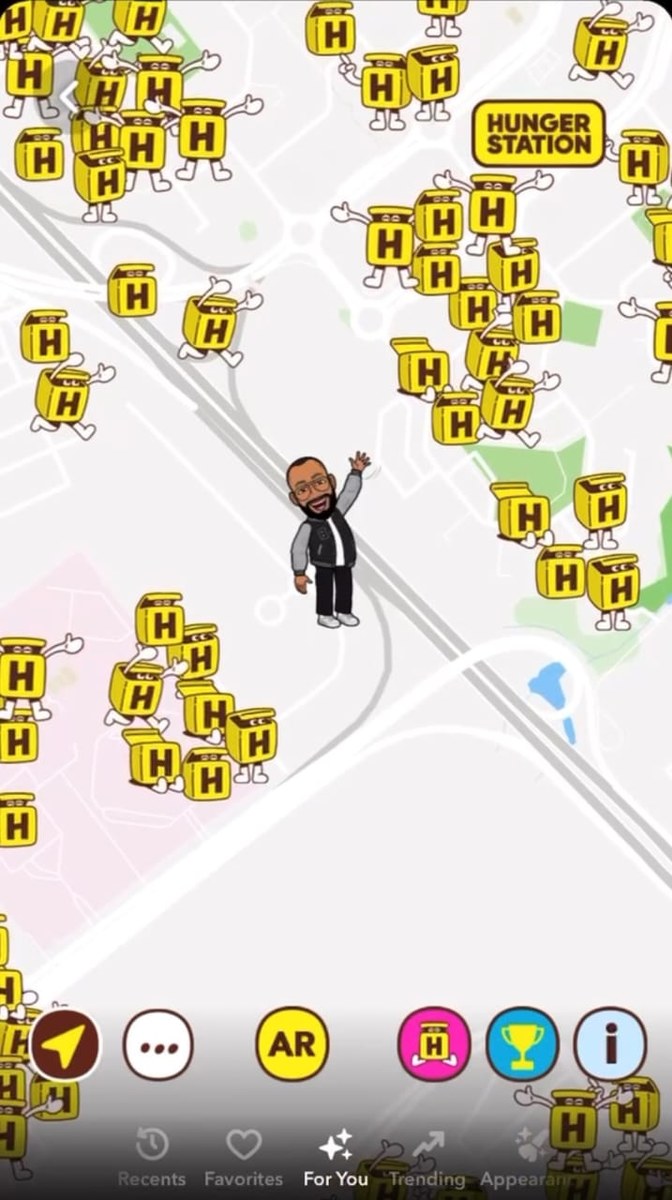
To participate, Snapchat users need to search for and collect HungerStation’s new branded boxes hidden around city maps to gain points using the AR map feature on Snapchat.
For users not based in Jeddah or Riyadh, a non-location minigame version is available that allows them to collect points too.
EU bans 4 more Russian media outlets from broadcasting in the bloc, citing disinformation

- The EU has already suspended Russia Today and Sputnik among several other outlets since February 2022
BRUSSELS: The European Union on Friday banned four more Russian media outlets from broadcasting in the 27-nation bloc for what it calls the spread of propaganda about the invasion of Ukraine and disinformation as the EU heads into parliamentary elections in three weeks.
The latest batch of broadcasters consists of Voice of Europe, RIA Novosti, Izvestia and Rossiyskaya Gazeta, which the EU claims are all under control of the Kremlin. It said in a statement that the four are in particular targeting “European political parties, especially during election periods.”
Belgium already last month opened an investigation into suspected Russian interference in June’s Europe-wide elections, saying its country’s intelligence service has confirmed the existence of a network trying to undermine support for Ukraine.
The Czech government has imposed sanctions on a number of people after a pro-Russian influence operation was uncovered there. They are alleged to have approached members of the European Parliament and offered them money to promote Russian propaganda.
Since the war started in February 2022, the EU has already suspended Russia Today and Sputnik among several other outlets.
Israeli soldiers post abusive videos despite army’s pledge to act: BBC analysis

- The BBC analyzed 45 photos and videos posted online by Israeli soldiers that showed Palestinian prisoners in the West Bank being abused and humiliated
LONDON: Israeli soldiers continue to post videos of abuse against Palestinian detainees despite a military pledge to take action against the perpetrators, analysis by the BBC has found.
The broadcaster said it had analyzed 45 photos and videos posted online by Israeli soldiers that showed Palestinian prisoners in the West Bank being abused and humiliated. Some were draped in Israeli flags.
Experts say the footage and images, which showed Palestinians being stripped, beaten and blindfolded, could breach international law and amount to a war crime.
The Israel Defense Forces said some soldiers had been disciplined or suspended for “unacceptable behavior” but did not comment on the individual cases identified by the BBC.
The most recent investigation into social media misconduct by Israeli soldiers follows a previous inquiry in which BBC Verify confirmed Israeli soldiers had filmed Gazan detainees while beating them and then posted the material on social platforms.
The Israeli military has carried out arbitrary arrests across Gaza and the West Bank, including East Jerusalem, since the Hamas attack on Oct. 7. The number of Palestinian prisoners in the West Bank has since risen to more than 7,060 according to the Commission of Detainees’ Affairs and the Palestinian Prisoner Society.
Ori Givati, spokesperson for Breaking the Silence, a non-governmental organization for Israeli veterans working to expose wrongdoing in the IDF, told the BBC he was “far from shocked” to hear the misconduct was ongoing.
Blaming “current far-right political rhetoric in the country” for further encouraging the abuse, he added: “There are no repercussions. They [Israeli soldiers] get encouraged and supported by the highest ministers of the government.”
He said this played into a mindset already subscribed to by the military: “The culture in the military, when it comes to Palestinians, is that they are only targets. They are not human beings. This is how the military teaches you to behave.”
The BBC’s analysis found that the videos and photos it examined were posted by 11 soldiers of the Kfir Brigade, the largest infantry brigade in the IDF. None of them hid their identity.
The IDF did not respond when the BBC asked about the actions of the individual soldiers and whether they had been disciplined.
The BBC also attempted to contact the soldiers on social media. The organization was blocked by one, while none of the others responded.
Mark Ellis, executive director of the International Bar Association, urged an investigation into the incidents shown in the footage and called for the IDF to discipline those involved.
In response to the BBC’s investigation, the IDF said: “The IDF holds its soldiers to a professional standard … and investigates when behavior is not in line with the IDF’s values. In the event of unacceptable behavior, soldiers were disciplined and even suspended from reserve duty.
“Additionally, soldiers are instructed to avoid uploading footage of operational activities to social media networks.”
However, it did not acknowledge its pledge to act on BBC Verify’s earlier findings in Gaza, according to the broadcaster.
4 journalists killed in Gaza as death toll climbs above 100

- 104 Palestinian media workers reported dead, along with 3 Lebanese and 2 Israelis
LONDON: The Gaza Media Authority on Thursday said that four journalists had been killed in an Israeli airstrike, bringing the total number of journalists killed in the conflict to more than 100.
The victims were identified as Hail Al-Najjar, a video editor at the Al-Aqsa Media Network; Mahmoud Jahjouh, a photojournalist at the Palestine Post website; Moath Mustafa Al-Ghefari, a photojournalist at the Kanaan Land website and Palestinian Media Foundation; and Amina Mahmoud Hameed, a program presenter and editor at several media outlets, according to the Anadolu Agency.
The Gaza Media Office said the four were killed in an Israeli airstrike, but did not provide additional details on the circumstances surrounding their deaths.
A total of 104 Palestinian journalists have been killed since the conflict began on Oct. 7. Two Israeli and three Lebanese media workers also have been killed.
The latest loss adds to the already heavy toll on media workers, with the Committee to Protect Journalists saying the Gaza conflict is the deadliest for journalists and media workers since it began keeping records.
Israel is continuing its offensive on Gaza despite a UN Security Council resolution demanding an immediate ceasefire.
On Thursday, South Africa, which has brought a case accusing Israel of genocide to the International Court of Justice, urged the court to order Israel to halt its assault on Rafah.
According to Gaza medical authorities, more than 35,200 Palestinians have been killed, mostly women and children, and over 79,200 have been injured since early October when Israel launched its offensive following an attack by Hamas.
Russia outlaws SOTA opposition news outlet

- Authorities said outlet tries to destabilize the socio-political situation in Russia
- Move could criminalize SOTA content and puts its reporters at risk of arrest
LONDON: Russia declared opposition media outlet SOTA “undesirable” on Thursday, a move that could criminalize the sharing of its content and put its reporters at risk of arrest.
Authorities in Russia have declared dozens of news outlets, think tanks and non-profit organizations “undesirable” since 2015, a label rights groups say is designed to deter dissent.
In a statement, Russia’s Prosecutor General accused SOTA of “frank attempts to destabilize the socio-political situation in Russia” and “create tension and irritation in society.”
“Such activities, obviously encouraged by so-called Western inspirers, have the goal of undermining the spiritual and moral foundations of Russian society,” it said.
It also accused SOTA of co-operating with TV Rain and The Insider, two other independent Russian-language outlets based outside of the country that are linked to the opposition.
SOTA Project, which covers opposition protests and has been fiercely critical of the Kremlin, denied it had anything to do with TV Rain and The Insider and rejected the claims.
But it advised its followers in Russia to “remove reposts and links” to its materials to avoid the risk of prosecution. SOTA’s Telegram channel has around 137,000 subscribers.
“Law enforcement and courts consider publishing online to be a continuing offense. This means that you can be prosecuted for reposts from 2023, 2022, 2021,” it said.
SOTA Project was born out of a split with a separate news outlet called SOTAvision, which still covers the opposition but distanced itself from the prosecutors’ ruling on Thursday.
Since launching its offensive in Ukraine, Moscow has waged an unprecedented crackdown on dissent that rights groups have likened to Soviet-era mass repression.
Among other organizations labelled as “undesirable” in Russia are the World Wildlife Fund, Greenpeace, Transparency International and Radio Free Europe/Radio Liberty.



